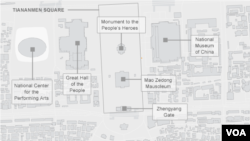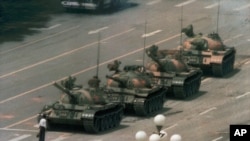BEIJING —
Working as a journalist under China’s strict media laws can be incredibly frustrating, especially during what authorities call "sensitive periods." But during this year's anniversary of the government's bloody crackdown on student protesters in Tiananmen Square, it has felt as if we were not just in a "sensitive period" but one that is "hypersensitive."
Each year, authorities warn activists and families of those killed in the crackdown against speaking with the media. Some are even kept under virtual house arrest.
This year, rights lawyer Pu Zhiqiang and several others were detained just for holding a private discussion about what happened a quarter of a century ago. Pu has been charged with picking quarrels, like many others who dare to discuss the topic.
Amnesty International says scores have been placed under house arrest, detained or questioned by police in recent weeks.
Threats, harrassment
Authorities have also turned up the heat on journalists, warning some of serious consequences in a bid to persuade them to not report on Tiananmen.
Many news agencies in Beijing have been warned not to go to Tiananmen Square to do reporting and some journalists have even been harassed on streets far away from the square while trying to have basic conversations about Tiananmen and June 4, 1989.
Authorities say the incident is too sensitive and have tried to block news coverage by harassing journalists and those they would seek to interview.
In their meetings with journalists, authorities have reminded reporters that their local news assistants - who, in many cases, blend in with crowds here much better than some foreign correspondents - cannot do reporting work on their own. And although Chinese law says that reporters can interview anyone who accepts a request, authorities are now saying certain places such as Tiananmen Square require special permission as well.
Micromanagement
I have been working in China for a little less than two years and have had some encounters with authorities. But the micromanagement around the Tiananmen anniversary in recent weeks makes it hard not to wonder why - despite all of China's other major advances - the government still responds with a knee-jerk reaction in silencing dissenting views. Why are its leaders apparently so fearful of their own citizens?
There are definitely growing threats that Chinese authorities face.
Since October of last year, security has been steadily increasing in Beijing following what authorities called a terrorist attack on Tiananmen Square. At the intersection near where I live and work, it has become all too common to see nighttime roadside checks of license plates for vehicles heading in the direction of Tiananmen Square.
That intensity has grown following the brutal and tragic knife attack at Kunming railway station, where black-clad attackers killed 29 and wounded more than 140 people in March, and two other deadly attacks in Xinjiang. The government has blamed those attacks on separatist militants.
Reflections
On the afternoon of June 3, at about the same time that tensions were starting to build 25 years ago between the students and troops brought into Beijing to clear the square, I took a ride on my bike down Changan Avenue, the wide Beijing throughway that goes straight to Tiananmen Square.
At every intersection, and along the way in between there were police in every direction. Security was particularly tight around nearby entrances to the city's expansive subway. The entrance to the Forbidden City teemed with tourists, and lines backed up at each end where intensive security checks were carried out.
Some people mingled about in Tiananmen Square, but there were more police and concession sales owners than visitors. As I drove back to the office, I stopped at an intersection and glanced up at the Beijing Hotel where the iconic photo of Tank Man was shot.
Sitting there with the cars and bikes racing by and the sun scorching down, it was hard to imagine what that moment must have been like, with the rumble of tanks and one man standing in their way.
Several blocks away at a daily press briefing, spokesman Hong Lei once again laid out the government's position on Tiananmen, stating that the Chinese government reached a conclusion about the political turmoil long ago. He also had this to say about dissidents in China.
"In China, there are only law breakers -- there are no so-called dissidents."
Each year, authorities warn activists and families of those killed in the crackdown against speaking with the media. Some are even kept under virtual house arrest.
This year, rights lawyer Pu Zhiqiang and several others were detained just for holding a private discussion about what happened a quarter of a century ago. Pu has been charged with picking quarrels, like many others who dare to discuss the topic.
Amnesty International says scores have been placed under house arrest, detained or questioned by police in recent weeks.
Threats, harrassment
Authorities have also turned up the heat on journalists, warning some of serious consequences in a bid to persuade them to not report on Tiananmen.
Many news agencies in Beijing have been warned not to go to Tiananmen Square to do reporting and some journalists have even been harassed on streets far away from the square while trying to have basic conversations about Tiananmen and June 4, 1989.
Authorities say the incident is too sensitive and have tried to block news coverage by harassing journalists and those they would seek to interview.
In their meetings with journalists, authorities have reminded reporters that their local news assistants - who, in many cases, blend in with crowds here much better than some foreign correspondents - cannot do reporting work on their own. And although Chinese law says that reporters can interview anyone who accepts a request, authorities are now saying certain places such as Tiananmen Square require special permission as well.
Micromanagement
I have been working in China for a little less than two years and have had some encounters with authorities. But the micromanagement around the Tiananmen anniversary in recent weeks makes it hard not to wonder why - despite all of China's other major advances - the government still responds with a knee-jerk reaction in silencing dissenting views. Why are its leaders apparently so fearful of their own citizens?
There are definitely growing threats that Chinese authorities face.
Since October of last year, security has been steadily increasing in Beijing following what authorities called a terrorist attack on Tiananmen Square. At the intersection near where I live and work, it has become all too common to see nighttime roadside checks of license plates for vehicles heading in the direction of Tiananmen Square.
That intensity has grown following the brutal and tragic knife attack at Kunming railway station, where black-clad attackers killed 29 and wounded more than 140 people in March, and two other deadly attacks in Xinjiang. The government has blamed those attacks on separatist militants.
Reflections
On the afternoon of June 3, at about the same time that tensions were starting to build 25 years ago between the students and troops brought into Beijing to clear the square, I took a ride on my bike down Changan Avenue, the wide Beijing throughway that goes straight to Tiananmen Square.
At every intersection, and along the way in between there were police in every direction. Security was particularly tight around nearby entrances to the city's expansive subway. The entrance to the Forbidden City teemed with tourists, and lines backed up at each end where intensive security checks were carried out.
Some people mingled about in Tiananmen Square, but there were more police and concession sales owners than visitors. As I drove back to the office, I stopped at an intersection and glanced up at the Beijing Hotel where the iconic photo of Tank Man was shot.
Sitting there with the cars and bikes racing by and the sun scorching down, it was hard to imagine what that moment must have been like, with the rumble of tanks and one man standing in their way.
Several blocks away at a daily press briefing, spokesman Hong Lei once again laid out the government's position on Tiananmen, stating that the Chinese government reached a conclusion about the political turmoil long ago. He also had this to say about dissidents in China.
"In China, there are only law breakers -- there are no so-called dissidents."






